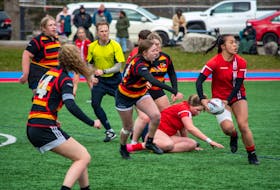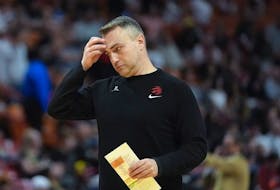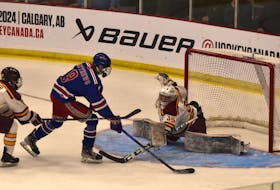Alex Duckworth has a funny story about Justin Kripps, the Canadian two-man bobsled pilot who just won gold with teammate Alex Kopacz at the 2018 Pyeongchang Winter Olympics in South Korea.
Duckworth, a snowboarder from Nova Scotia, is offering her insights into what it’s like to be in the middle of the whirlwind at the pinnacle of sport from her time at the 2014 Winter Olympics in Sochi, Russia.
She was soaking in the experience when she got to meet Kripps, who at the time was competing in his second Olympics.
“He was one of the first people I met in Sochi and we pieced together that our parents — his dad and my mom — used to date in the ’70s,” Duckworth said in a recent interview. “Canada’s so small, so there’s all kinds of funny little connections there.
“It’s just so fun,” Duckworth said in a telephone call from Toronto, where she’s working with CBC as an associate producer on its Olympics digital team. “It’s so exciting to get out there and then realize the scale of the event, realize how big of a team that you’re actually a part of, get to meet all the other Canadian athletes, learn about their sports and then get to watch them firsthand.”
She called it the “ultimate sporting experience,” even for someone who’s not a big sports fan overall.
“Coming from Nova Scotia, I never had a professional sports team to really cheer for or anything. So it was a really cool experience in that way, getting behind a team and just getting a better understanding of all the sports.”
Duckworth said there’s nothing to compare with it. When she competed at the world championships, snowboarding was just one sport. Multiply that by 15 and add in three weeks of in-depth, nonstop coverage to worldwide interest.
“There’s a certain level of excitement as you get on from one stage of sport to the next. So getting to compete in my first World Cup had a similar amount of excitement, and then world
championships, and then the Olympics, so it’s all kind of this progressive build and they each have their own sort of tone. But, the Olympics, you definitely feel the attention the world’s putting on it and the support you’re getting from your home town, which you don’t necessarily get if you’re competing at a world championships or something like that.”
Duckworth, who’s from Kingsburg, Lunenburg County, was 10th in halfpipe at the 2013 world championships, the best result of the Canadian women in the event. She was an alternate for the Vancouver Olympics in 2010 and competed at Sochi, finishing 17th in halfpipe.
When you’re preparing for your own event, it’s pretty easy to “stick to your own program,” Duckworth said.
The athletes’ village can be fairly insular, so you can keep your focus, she said. There’s the dorm, the cafeteria and the gym. For training, you’d leave the village for the event site and then come right back.
You’re “in the bubble,” Duckworth said. “That’s an experience in itself, too. I was really happy to take that in. I had about a week in Sochi before I competed so I got to experience that focused, toneddown version of the Olympics and then I got to experience the madness of the village with all of the different country houses and all of the sponsor houses. . . . So it’s really this big, big bubble and there’s so much you can kind of do in that bubble.”
Besides the thrill of the competition itself, she also got the chance to be a fan. She competed on the sixth day and was able to stay until the very end of the Games.
“They reserve tickets for the athletes to go and spectate the other Canadians, luckily. You couldn’t always get the other tickets that you want, but I probably went to watch more events than anyone else.”
She had a lot of fun at the Canada Olympic House, a facility set up for athletes to hang out with family and friends as well as other athletes.
“I think Canada does a really good job of giving us a nice home away from home,” Duckworth said.“There’s food and drink and big screens to watch the events, (and) they do the medal ceremony in there at the end of every day.”
She said she probably spent more time there than anywhere else, but she also got to check out the equivalent houses for other nations.
But, she said, the emphasis is on meeting other Canadians and bonding as a team.
“It’s so great to meet all the athletes, but because it’s so overwhelming — there’s so much to do — I think everyone gets pretty excited about bringing the whole Canadian team together in one spot. That’s pretty exciting.”
Camaraderie was the order of the day. Sometimes a little more than that, too, facilitated by a social media dating app.
“What became a household brand, I guess, over my Olympics was Tinder,” Duckworth said. “Because a snowboarder actually tweeted out ‘can’t wait to Tinder in the Olympic village.’ And then it just blew up worldwide. So that was kind of like a funny joke. She was a New Zealand snowboarder so she kind of became that ‘Tinder girl’ over the Olympics, which I’m sure is happening again this year.”
There’s a strict rule against partying in the athletes’ village, though. Duckworth said they had to go out to socialize.
Now retired from competition, Duckworth has been making documentary and short travel films. Last year, she worked with the Canadian Olympic Committee in Montreal as program manager of its athlete marketing department before taking on the current role with CBC.
“I want to say good luck to everyone over there,” she said. “It’s crazy how fast four years go by.”








